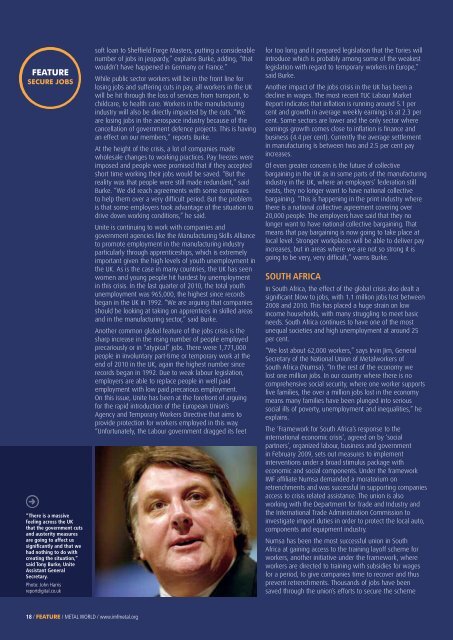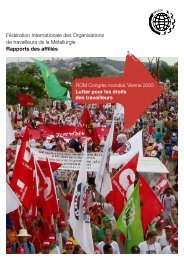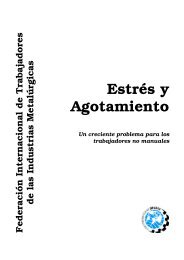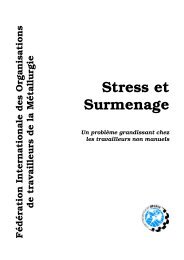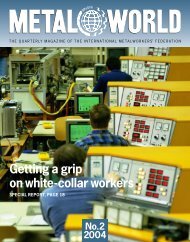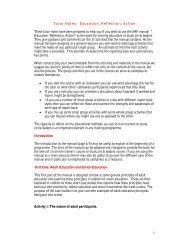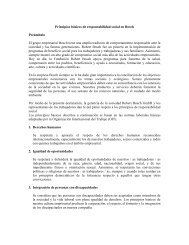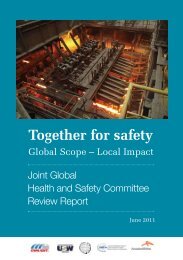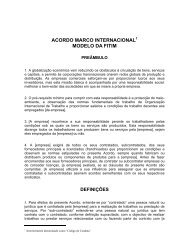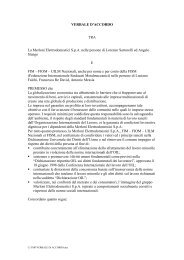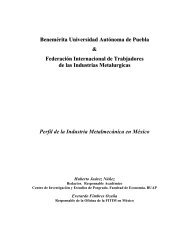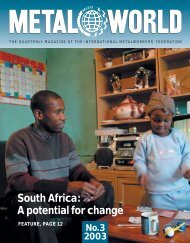Metal World 1 2011 - International Metalworkers' Federation
Metal World 1 2011 - International Metalworkers' Federation
Metal World 1 2011 - International Metalworkers' Federation
Create successful ePaper yourself
Turn your PDF publications into a flip-book with our unique Google optimized e-Paper software.
FEATURE<br />
SECURE JOBS<br />
“There is a massive<br />
feeling across the uK<br />
that the government cuts<br />
and austerity measures<br />
are going to affect us<br />
significantly and that we<br />
had nothing to do with<br />
creating the situation,”<br />
said Tony Burke, unite<br />
Assistant General<br />
Secretary.<br />
Photo: John Harris<br />
reportdigital.co.uk<br />
18 / FeatUre / <strong>Metal</strong> <strong>World</strong> / www.imfmetal.org<br />
soft loan to Sheffield Forge Masters, putting a considerable<br />
number of jobs in jeopardy,” explains Burke, adding, “that<br />
wouldn’t have happened in Germany or France.”<br />
While public sector workers will be in the front line for<br />
losing jobs and suffering cuts in pay, all workers in the UK<br />
will be hit through the loss of services from transport, to<br />
childcare, to health care. Workers in the manufacturing<br />
industry will also be directly impacted by the cuts. “We<br />
are losing jobs in the aerospace industry because of the<br />
cancellation of government defence projects. This is having<br />
an effect on our members,” reports Burke.<br />
At the height of the crisis, a lot of companies made<br />
wholesale changes to working practices. Pay freezes were<br />
imposed and people were promised that if they accepted<br />
short time working their jobs would be saved. “But the<br />
reality was that people were still made redundant,” said<br />
Burke. “We did reach agreements with some companies<br />
to help them over a very difficult period. But the problem<br />
is that some employers took advantage of the situation to<br />
drive down working conditions,” he said.<br />
Unite is continuing to work with companies and<br />
government agencies like the Manufacturing Skills Alliance<br />
to promote employment in the manufacturing industry<br />
particularly through apprenticeships, which is extremely<br />
important given the high levels of youth unemployment in<br />
the UK. As is the case in many countries, the UK has seen<br />
women and young people hit hardest by unemployment<br />
in this crisis. In the last quarter of 2010, the total youth<br />
unemployment was 965,000, the highest since records<br />
began in the UK in 1992. “We are arguing that companies<br />
should be looking at taking on apprentices in skilled areas<br />
and in the manufacturing sector,” said Burke.<br />
Another common global feature of the jobs crisis is the<br />
sharp increase in the rising number of people employed<br />
precariously or in “atypical” jobs. There were 1,771,000<br />
people in involuntary part-time or temporary work at the<br />
end of 2010 in the UK, again the highest number since<br />
records began in 1992. Due to weak labour legislation,<br />
employers are able to replace people in well paid<br />
employment with low paid precarious employment.<br />
On this issue, Unite has been at the forefront of arguing<br />
for the rapid introduction of the European Union’s<br />
Agency and Temporary Workers Directive that aims to<br />
provide protection for workers employed in this way.<br />
“Unfortunately, the Labour government dragged its feet<br />
for too long and it prepared legislation that the Tories will<br />
introduce which is probably among some of the weakest<br />
legislation with regard to temporary workers in Europe,”<br />
said Burke.<br />
Another impact of the jobs crisis in the UK has been a<br />
decline in wages. The most recent TUC Labour Market<br />
Report indicates that inflation is running around 5.1 per<br />
cent and growth in average weekly earnings is at 2.3 per<br />
cent. Some sectors are lower and the only sector where<br />
earnings growth comes close to inflation is finance and<br />
business (4.4 per cent). Currently the average settlement<br />
in manufacturing is between two and 2.5 per cent pay<br />
increases.<br />
Of even greater concern is the future of collective<br />
bargaining in the UK as in some parts of the manufacturing<br />
industry in the UK, where an employers’ federation still<br />
exists, they no longer want to have national collective<br />
bargaining. “This is happening in the print industry where<br />
there is a national collective agreement covering over<br />
20,000 people. The employers have said that they no<br />
longer want to have national collective bargaining. That<br />
means that pay bargaining is now going to take place at<br />
local level. Stronger workplaces will be able to deliver pay<br />
increases, but in areas where we are not so strong it is<br />
going to be very, very difficult,” warns Burke.<br />
SOuTH AFRICA<br />
In South Africa, the effect of the global crisis also dealt a<br />
significant blow to jobs, with 1.1 million jobs lost between<br />
2008 and 2010. This has placed a huge strain on low<br />
income households, with many struggling to meet basic<br />
needs. South Africa continues to have one of the most<br />
unequal societies and high unemployment at around 25<br />
per cent.<br />
“We lost about 62,000 workers,” says Irvin Jim, General<br />
Secretary of the National Union of <strong>Metal</strong>workers of<br />
South Africa (Numsa). “In the rest of the economy we<br />
lost one million jobs. In our country where there is no<br />
comprehensive social security, where one worker supports<br />
five families, the over a million jobs lost in the economy<br />
means many families have been plunged into serious<br />
social ills of poverty, unemployment and inequalities,” he<br />
explains.<br />
The ‘Framework for South Africa’s response to the<br />
international economic crisis’, agreed on by ‘social<br />
partners’, organized labour, business and government<br />
in February 2009, sets out measures to implement<br />
interventions under a broad stimulus package with<br />
economic and social components. Under the framework<br />
IMF affiliate Numsa demanded a moratorium on<br />
retrenchments and was successful in supporting companies<br />
access to crisis related assistance. The union is also<br />
working with the Department for Trade and Industry and<br />
the <strong>International</strong> Trade Administration Commission to<br />
investigate import duties in order to protect the local auto,<br />
components and equipment industry.<br />
Numsa has been the most successful union in South<br />
Africa at gaining access to the training layoff scheme for<br />
workers, another initiative under the framework, where<br />
workers are directed to training with subsidies for wages<br />
for a period, to give companies time to recover and thus<br />
prevent retrenchments. Thousands of jobs have been<br />
saved through the union’s efforts to secure the scheme


